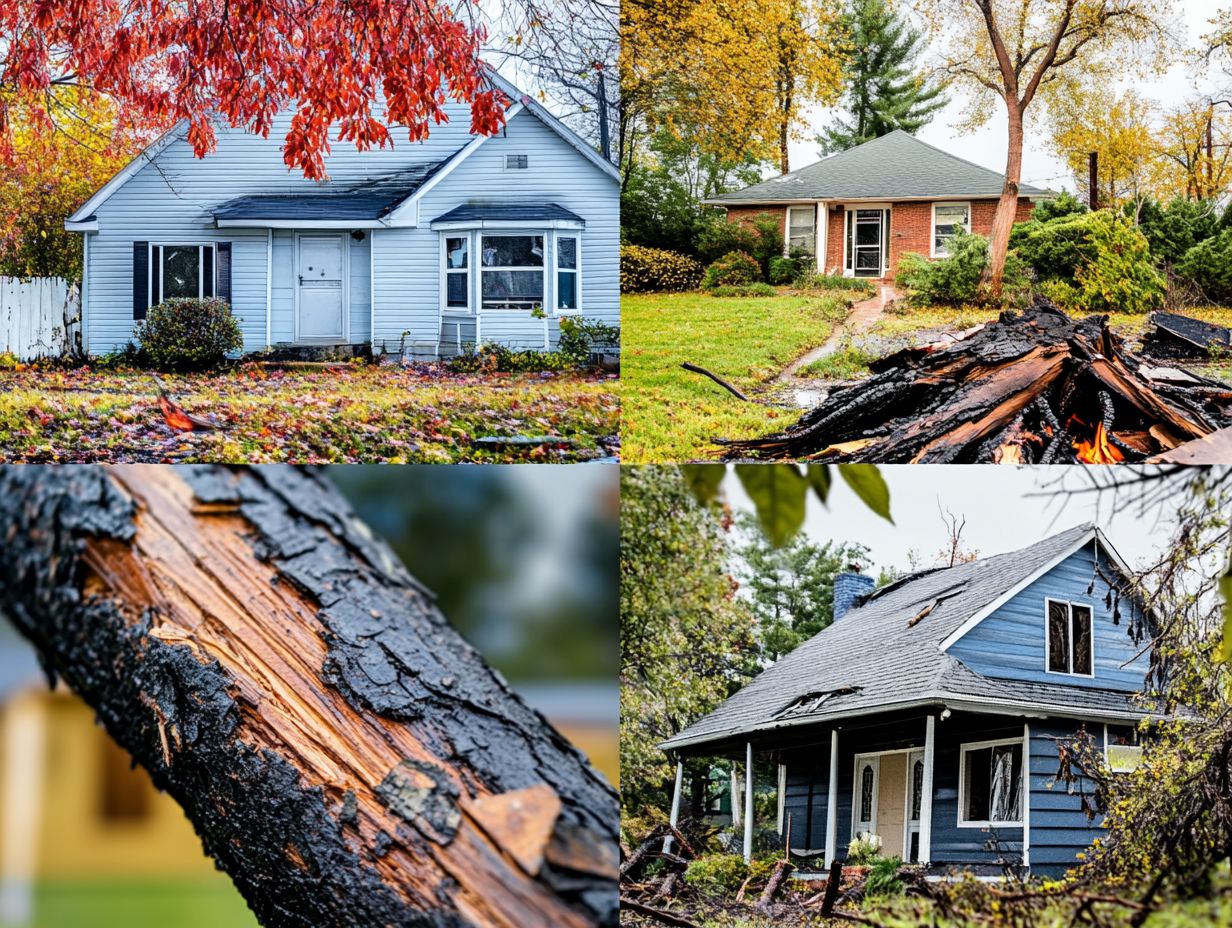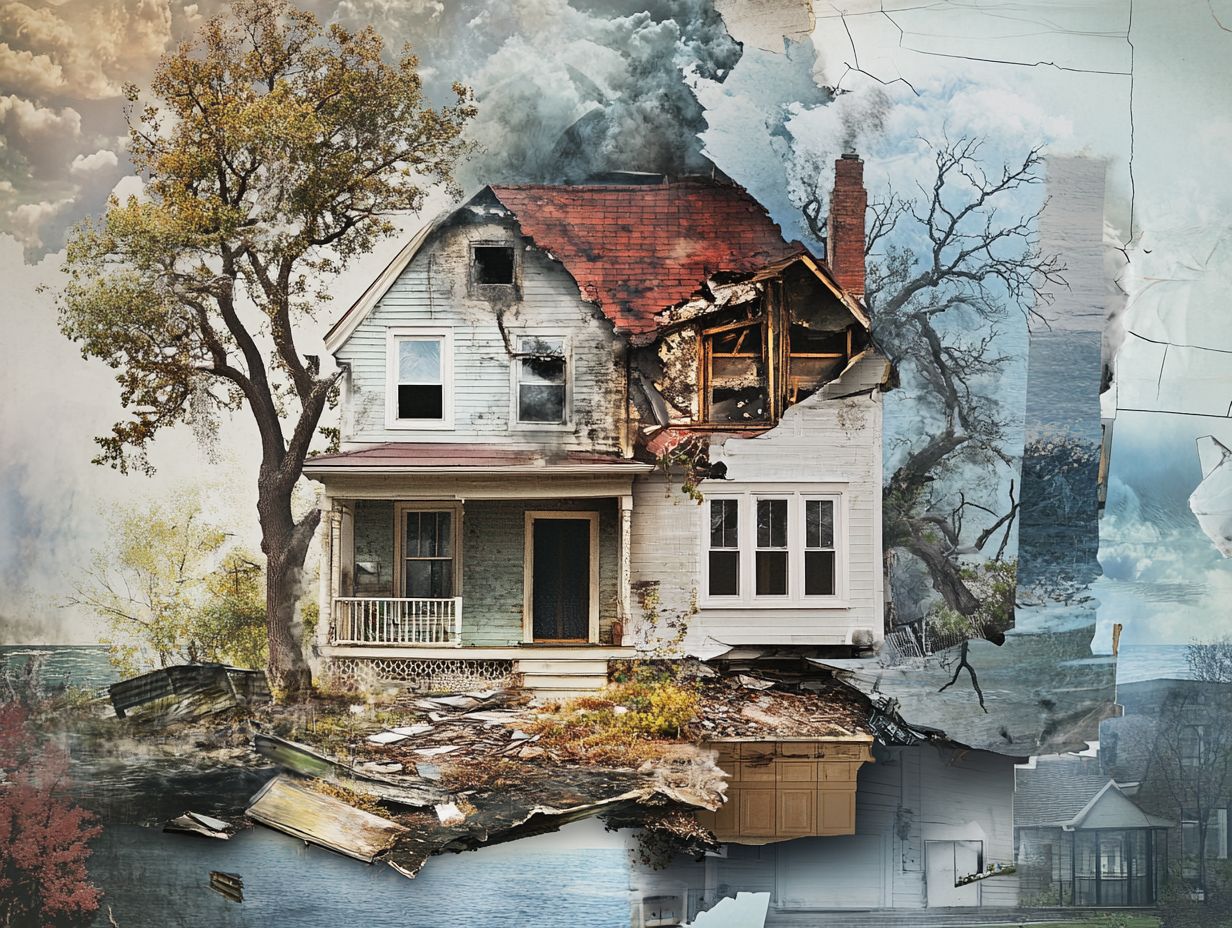5 Most Common Home Insurance Claims and How to Handle
Owning a home comes with responsibilities, including understanding your home insurance.
Unexpected events like water damage and theft can occur. Being informed about claims can save you time, money, and stress.
This guide covers the five most common home insurance claims and explains the claim-filing process. You’ll learn what information you need and how to prevent future issues.
This guide is for first-time homeowners and those looking to refresh their knowledge.
Contents
- Key Takeaways:
- 1. Water Damage
- 2. Fire Damage
- 3. Theft and Burglary
- 4. Wind and Hail Damage
- 5. Liability Claims
- How to File a Home Insurance Claim?
- What Information Do You Need to Provide When Filing a Claim?
- How Long Does It Take for a Home Insurance Claim to Be Processed?
- What Are the Steps to Take After Filing a Claim?
- How Can You Prevent Common Home Insurance Claims?
- What Are the Coverage Limits for These Types of Claims?
- Should You Consider Additional Coverage for These Types of Claims?
- What Are the Common Reasons for Claim Denials?
- How Can You Handle Disputes with Your Insurance Company?
- What Are the Alternatives to Filing a Claim?
- Frequently Asked Questions
Key Takeaways:

Water damage is the most common claim and can arise from burst pipes, faulty appliances, or flooding.
Fire damage can be devastating. Make sure you have the right coverage and know how to prevent fires.
Theft and burglary claims are common too. To safeguard your home, it’s important to keep an inventory of your belongings and understand how home insurance providers handle claims.
1. Water Damage
Water damage can be one of the worst experiences for homeowners, often leading to costly repairs. Understanding your homeowners insurance coverage is key, especially regarding leaks and floods.
Know the types of water damage covered. Homeowners insurance often covers sudden incidents like burst pipes, but gradual leaks may not.
Review your coverage limits to ensure you’re protected against potential losses.
Being aware of how damages can affect your insurance rates helps you make informed decisions about maintenance and coverage.
2. Fire Damage
Fire damage poses a serious risk, leading to significant property loss. Having strong homeowners insurance is vital, especially in areas prone to wildfires.
Insurance typically covers fires caused by lightning, electrical issues, or accidents. Each year, around 350,000 residential fires occur in the U.S., causing billions in losses.
Liability insurance is also crucial, providing protection against claims for damages or injuries. This safety net allows you to face challenges confidently.
3. Theft and Burglary
Theft and burglary can result in lost belongings and emotional distress. Understanding your homeowners insurance coverage for stolen items is essential.
Your personal belongings, including electronics and jewelry, are usually covered. Document losses carefully with photos and proof of ownership.
After filing, the insurance company will review your claim based on your policy limits and deductibles. Claims can be denied for reasons like late reporting or lack of evidence.
If your items aren t covered under your policy, you might face losses without compensation.
4. Wind and Hail Damage
Wind and hail damage are hazards that can significantly impact your home. They often cause extensive property damage, making a strong homeowners insurance policy essential, especially in areas prone to extreme weather.
You need to know how your homeowners insurance handles wind and hail damage. Understanding these factors is crucial, especially when considering tips for filing an efficient home insurance claim, as they can directly affect your claims history.
Frequent claims might raise red flags for underwriters, which could lead to higher premiums. Additionally, consider the unique climate patterns in your region; some areas are more susceptible to severe storms. This can affect both the likelihood of damage and the overall cost of your insurance.
By staying informed and proactive, you can make well-informed decisions when choosing policies that protect against these common threats.
5. Liability Claims

Liability claims can carry substantial financial consequences for homeowners. It s imperative to ensure your homeowners insurance offers adequate coverage limits.
This coverage is crucial for protecting yourself against potential lawsuits stemming from accidents or injuries on your property. Claims can arise from various incidents, such as a visitor slipping and falling or a pet injuring a neighbor.
Homeowners might also face claims related to negligence, like not maintaining walkways or fencing. Understanding liability coverage is key to making informed financial decisions.
You might even consider extra insurance that covers claims beyond your regular policy. This can safeguard your assets against unexpectedly high claims.
How to File a Home Insurance Claim?
Filing a home insurance claim is a systematic journey. You need to grasp the details of your policy’s coverage, document your claims history, and communicate effectively with your insurance provider. To streamline this process, consider exploring strategies for fast home insurance claims.
This ensures a seamless payout, especially after property damage or loss. Understanding your coverage can significantly impact the outcome.
- First, report your claim immediately to avoid delays. Reach out to your insurance company promptly after an incident.
- Next, gather all relevant documentation, including photographs of the damage and receipts for repairs or replacements.
- Another vital step is to maintain meticulous records of all communication with the insurer. This can serve as essential evidence should any disputes arise.
Watch out for pitfalls like underreporting damage or neglecting to document conversations. These can slow down the process. Being proactive and thorough will pave the way for quicker claim resolution.
What Information Do You Need to Provide When Filing a Claim?
When you file a home insurance claim, provide comprehensive information. This should include details about the property damage, your claims history, and any relevant documentation to substantiate your claim.
Make sure to include clear photographs of the damage, capturing multiple angles for a complete perspective. If your situation involves theft or vandalism, having a police report is crucial it adds credibility.
Don t forget to include receipts for repairs or an inventory list of affected items. These can further bolster your claim by providing concrete evidence of your losses.
Accurate and thorough documentation not only expedites the review process but also significantly impacts the potential payout. This ensures you receive the compensation you rightfully deserve.
Don t wait get started on your claim process today!
How Long Does It Take for a Home Insurance Claim to Be Processed?
The processing time for your home insurance claims can vary significantly. It depends on the claim’s complexity, your insurer’s efficiency, and your previous claims history.
Typically, expect timelines from a few days to several weeks for the final payout.
Factors like the required documents, the thoroughness of the investigation, and your insurer’s policies can all influence this timeline.
For complicated claims involving extensive damage or multiple incidents, a more detailed assessment may be necessary.
To expedite your claims, consider these proactive steps:
- Provide all necessary documents upfront.
- Communicate promptly.
- Stay organized throughout the process.
Familiarize yourself with your insurer’s guidelines and follow up regularly to keep the process moving smoothly.
What Are the Steps to Take After Filing a Claim?
After filing a home insurance claim, take crucial steps to ensure effective communication with your insurance provider. Maintaining thorough documentation and following up diligently can help you avoid common home insurance pitfalls.
Start by contacting your insurance representatives to confirm they ve received your claim. Ask about any specific documents or information they might need.
Track the progress of your claim carefully. Keep a record of all correspondence and note any deadlines set by the insurer.
Document ongoing repairs and developments related to your claim. This evidence could be vital for a smooth resolution.
How Can You Prevent Common Home Insurance Claims?

Preventing common home insurance claims saves you time and money! By taking proactive steps against property damage, you can significantly minimize risks.
Regular maintenance of your roof, gutters, and plumbing systems helps safeguard against potential damage. Use proper landscaping techniques, like trimming trees away from your house to prevent falling branches during storms.
Install smoke detectors and security systems to protect your property and potentially lower your insurance premiums. Insurers often reward such diligence with discounts.
What Are the Coverage Limits for These Types of Claims?
Understanding the coverage limits of your homeowners insurance is crucial. These limits determine the financial support you can expect for claims related to water damage, fire, theft, or liability incidents.
Think of these limits as your safety net. They dictate the maximum reimbursement available for specific damages or losses.
Regularly review and adjust these coverage limits, especially when your personal circumstances change. This ensures that your protection remains both adequate and cost-effective.
Should You Consider Additional Coverage for These Types of Claims?
Considering additional coverage for specific types of claims, such as water damage or liability, can offer you peace of mind and financial security. This is especially important when standard homeowners insurance might fall short in addressing potential risks.
Exploring options like flood insurance becomes crucial if you reside in areas prone to flooding, where even minor weather events can wreak havoc on your property.
An umbrella policy, which means extra liability coverage, can act as a valuable safety net, extending your liability protection beyond standard limits and safeguarding your assets against significant claims.
By investing in these supplementary coverages, you can strengthen your finances, ensuring you’re better equipped to tackle unforeseen challenges and maintain the integrity of your home and investments.
What Are the Common Reasons for Claim Denials?
Homeowners often find themselves grappling with frustration when their claims are denied. This typically happens due to common pitfalls like insufficient documentation, terms that your policy doesn’t cover, or failure to maintain the property. By following tips for dealing with home insurance adjusters, you can understand your homeowners insurance policy better and potentially save money and reduce stress.
To navigate these challenges effectively, take proactive steps to ensure that all necessary paperwork is completed and submitted with precision. Familiarizing yourself with the specific details of your policy is vital; take note of any exclusions that could impact your coverage.
Keeping organized records will greatly bolster your case. Regular maintenance of your property can also stave off claim denials due to neglect. By adhering to these guidelines, you can reduce the chances of facing claim denials and ensure a smoother reimbursement experience when the need arises.
How Can You Handle Disputes with Your Insurance Company?
Handling disputes with your insurance company requires a strategic approach. Start by fully understanding your homeowners insurance policy, maintaining comprehensive documentation, and effectively communicating your concerns.
Begin by thoroughly reviewing your policy terms to grasp the specifics of coverage, exclusions, and any relevant clauses that could impact your claim. If confusion arises, don t hesitate to reach out to your insurance provider for clarification; they can offer valuable insights and help outline your next steps.
Keep meticulous records of all communications with the insurer, such as emails and phone calls this will serve as invaluable evidence. If direct negotiations stall, consider mediation as an alternative dispute resolution method. This approach can enable both parties to reach a mutually satisfactory agreement without the need for more formal legal processes.
What Are the Alternatives to Filing a Claim?

Explorar opciones en lugar de presentar una reclamaci n abre un mundo de opciones viables para gestionar da os a la propiedad, todo sin afectar tu historial de reclamaciones o prima de seguro. Esto puede ofrecer un enfoque financieramente m s s lido en situaciones espec ficas.
Al considerar alternativas como el autoasegurarse para da os menores, puedes absorber costos de reparaci n m s peque os sin involucrar a tu proveedor de seguros, preservando tu cobertura para problemas m s significativos en el futuro.
Establecer un fondo de emergencia dedicado a reparaciones inesperadas no solo construye resiliencia financiera, sino que tambi n promueve la propiedad responsable. Tambi n podr as descubrir que negociar directamente con los proveedores de servicios resulta efectivo; esta estrategia puede generar ahorros en costos mientras evitas las complejidades asociadas con las reclamaciones.
A largo plazo, estas decisiones pueden influir positivamente en tus costos de seguro futuros y opciones de cobertura, mejorando tu estabilidad financiera y mejorando tus estrategias generales de manejo de reclamaciones.
Frequently Asked Questions
What are the 5 most common home insurance claims?
The 5 most common home insurance claims are water damage, fire damage, theft, wind damage, and liability claims. Knowing tips for a smooth home insurance claims experience can help you navigate the process more effectively.
How can I prevent water damage in my home?
To prevent water damage, regularly check your plumbing and roof.
Installing a sump pump can also help, and consider adding flood insurance to your policy.
What should I do if my home experiences fire damage?
If your home suffers from fire damage, contact your insurance company without delay.
Document the damage with photos and make temporary repairs to stop further issues.
What steps should I take in case of theft?
If you’re a victim of theft, report it to the police right away.
Don t forget to inform your insurance company and provide a list of stolen items with evidence, like security camera footage.
What should I do if my home suffers wind damage?
If your home is damaged by wind, take photos of the damage immediately.
Contact your insurance company, and make temporary repairs to prevent more damage while keeping all your receipts.
What can I do to handle liability claims?
If someone is injured on your property, contact your insurance company right away.
Gather evidence to support your case and cooperate during the claims process to reach a quick resolution.





